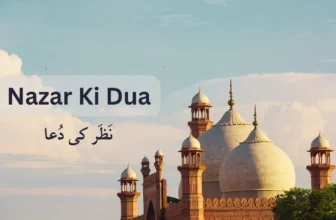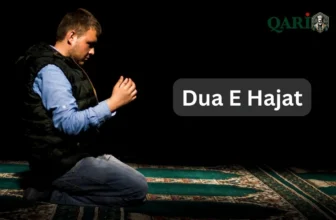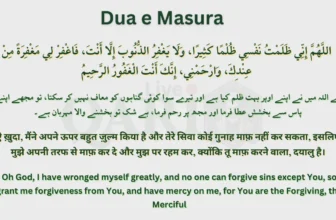
Have you ever wondered about the special prayer Muslims recite during the night?
Dua Qunoot, a heartfelt supplication, holds a unique place in the late-night prayer called Witr. Let’s unlock the secrets of this beautiful prayer, exploring its meanings, historical context, and practical applications in our lives.
Dive into a wealth of resources, including texts, audio recitations, translations, and insightful commentary, to deepen your understanding and connection with this remarkable dua.
Embark on this enlightening journey to discover the peace and blessings Dua Qunoot and witr bring to our prayers and lives.
What is Dua Qunoot?
Dua Qunoot isn’t a verse from the Quran, so it doesn’t have a specific place in the Quran’s order. It’s like a special prayer we say during the night prayer called Witr.
It’s usually one long sentence with around 94 words and 385 letters, depending on which version we’re using.
Even though there are different ways to say it, they all have the same message of asking Allah for guidance and protection.
Let’s examine some of these different versions and learn more about this special prayer.
Did this exploration of Dua Qunoot enhance your nighttime prayers? Share your thoughts and reflections!
Dua Qunoot and witr: Recitation Video: A Guide to Nighttime Prayer.
Dua Qunoot and witr: Complete Text and Guide (PDF Download)
How to Perform Dua Qunoot during Witr Prayer?
Intention (Niyyah):
Begin by intending to perform the Witr prayer and recite Dua Qunoot.
Start with Witr:
Perform the Witr prayer as you usually do. This typically involves:
Three Rak’ahs:
First Rak’ah: Recite Surah Al-Fatiha (the opening chapter of the Quran), followed by another Surah of your choice.
Second Rak’ah:
Recite Surah Al-Fatiha followed by another Surah.
Third Rak’ah:
Recite Surah Al-Fatiha followed by Surah Al-Ikhlas, Surah Al-Falaq, and Surah An-Nas.
Raise Hands for Dua Qunoot:
After completing the third rak’ah, remain standing and raise your hands in supplication.
Recite Dua Qunoot:
Choose the version of Dua Qunoot that you prefer. Some common versions include:
Conclude with Salaam:
End the prayer with the customary salutation of peace, turning your head to the right and then to the left, saying, “ٱلسَّلَامُ عَلَيْكُمْ وَرَحْمَةُ ٱللَّٰهِ” (Peace be upon you and the mercy of Allah).
Important Note:
Dua Qunoot, a special Witr prayer, is sometimes recited during Ramadan. It’s a heartfelt way to connect with Allah and ask for forgiveness, guidance, and protection. Choose a version that resonates with you and recite it sincerely and passionately.
May Allah accept your prayers!
A Muslim reciting dua qunoot during witr prayer.
The Revelation of Dua Qunoot and Witr:: A Reminder of Blessings and Responsibilities ?

Dua Qunoot, a special prayer during the night prayer Witr, is like a heartfelt chat with God.
It’s a time to apologize for our mistakes, ask for help to make good choices, and ask God to keep us safe.
This prayer reminds us how much God loves and wants to hear from us.
It’s like a warm hug from God that makes us feel secure and loved.
Related Posts
- Dua e Qunoot: A Comprehensive Guide
- Translation and Tafseer of Dua Qunoot
- Dua Ganjul Arsh
- Dua For Waking Up
Benefits of Reciting Dua e Qunoot and Witr:
Express devotion and gratitude.
Acknowledge shortcomings and seek direction.
Reaffirm belief and trust in Allah
Earn blessings and mercy through worship.
Earn blessings and mercy through worship.
Find peace and tranquility in your nightly prayers.

Dua Qunoot as a Daily Practice:

Dua Qunoot in Witr: Your Questions Answered
A special time each night to connect with God and ask for blessings.
A way to build a stronger relationship with God and feel His presence.
Finding comfort, peace, and strength when tough.
A reminder to always do what is right and ask God for help.
A way to learn more about your faith and become closer to God.
What is Dua Qunoot?
A special supplication recited during the night prayer called Witr, seeking Allah’s guidance, forgiveness, and protection.
Why is it important in Islam?
It was taught and practiced by the Prophet Muhammad (PBUH), emphasizing its significance for Muslims as a means of seeking Allah’s blessings and refuge.
How does it benefit the one who recites it?
It strengthens faith, deepens the connection with Allah, brings peace of mind, and seeks forgiveness and guidance.
When is Dua Qunoot recited?
It is typically recited during the last Rak’ah (unit of prayer) of the Witr prayer.
Can I recite Dua Qunoot in any language?
While the original Arabic text is preferred, you can also recite its translation in your own language to understand its meaning and connect with the supplication







